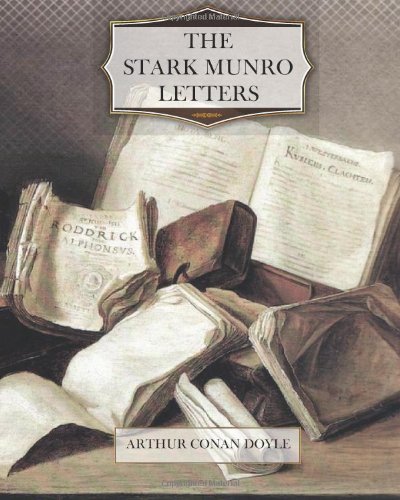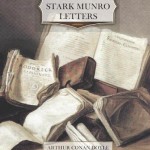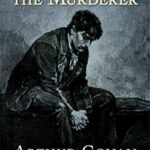Well, my dear Bertie, here I am again in your postbox. It’s not a fortnight since I wrote you that great long letter, and yet you see I have news enough to make another formidable budget. They say that the art of letter-writing has been lost; but if quantity may atone for quality, you must confess that (for your sins) you have a friend who has retained it.

When I wrote to you last I was on the eve of going down to join the Cullingworths at Avonmouth, with every hope that he had found some opening for me. I must tell you at some length the particulars of that expedition.
I travelled down part of the way with young Leslie Duncan, whom I think you know. He was gracious enough to consider that a third-class carriage and my company were to be preferred to a first class with solitude. You know that he came into his uncle’s money a little time ago, and after a first delirious outbreak, he has now relapsed into that dead heavy state of despair which is caused by having everything which one can wish for. How absurd are the ambitions of life when I think that I, who am fairly happy and as keen as a razor edge, should be struggling for that which I can see has brought neither profit nor happiness to him! And yet, if I can read my own nature, it is not the accumulation of money which is my real aim, but only that I may acquire so much as will relieve my mind of sordid cares and enable me to develop any gifts which I may have, undisturbed. My tastes are so simple that I cannot imagine any advantage which wealth can give—save indeed the exquisite pleasure of helping a good man or a good cause. Why should people ever take credit for charity when they must know that they cannot gain as much pleasure out of their guineas in any other fashion? I gave my watch to a broken schoolmaster the other day (having no change in my pocket), and the mater could not quite determine whether it was a trait of madness or of nobility. I could have told her with absolute confidence that it was neither the one nor the other, but a sort of epicurean selfishness with perhaps a little dash of swagger away down at the bottom of it. What had I ever had from my chronometer like the quiet thrill of satisfaction when the fellow brought me the pawn ticket and told me that the thirty shillings had been useful?
Leslie Duncan got out at Carstairs, and I was left alone with a hale, white-haired, old Roman Catholic priest, who had sat quietly reading his office in the corner. We fell into the most intimate talk, which lasted all the way to Avonmouth—indeed, so interested was I that I very nearly passed through the place without knowing it. Father Logan (for that was his name) seemed to me to be a beautiful type of what a priest should be—self-sacrificing and pure-minded, with a kind of simple cunning about him, and a deal of innocent fun. He had the defects as well as the virtues of his class, for he was absolutely reactionary in his views. We discussed religion with fervour, and his theology was somewhere about the Early Pliocene. He might have chattered the matter over with a priest of Charlemagne’s Court, and they would have shaken hands after every sentence. He would acknowledge this and claim it as a merit. It was consistency in his eyes. If our astronomers and inventors and law-givers had been equally consistent where would modern civilisation be? Is religion the only domain of thought which is non-progressive, and to be referred for ever to a standard set two thousand years ago? Can they not see that as the human brain evolves it must take a wider outlook? A half-formed brain makes a half-formed God, and who shall say that our brains are even half-formed yet? The truly inspired priest is the man or woman with the big brain. It is not the shaven patch on the outside, but it is the sixty ounces within which is the real mark of election.
You know that you are turning up your nose at me, Bertie. I can see you do it. But I’ll come off the thin ice, and you shall have nothing but facts now. I’m afraid that I should never do for a story-teller, for the first stray character that comes along puts his arm in mine and walks me off, with my poor story straggling away to nothing behind me.
Well, then, it was night when we reached Avonmouth, and as I popped my head out of the carriage window, the first thing that my eyes rested upon was old Cullingworth, standing in, the circle of light under a gas-lamp. His frock coat was flying open, his waistcoat unbuttoned at the top, and his hat (a top hat this time) jammed on the back of his head, with his bristling hair spurting out in front of it. In every way, save that he wore a collar, he was the same Cullingworth as ever. He gave a roar of recognition when he saw me, bustled me out of my carriage, seized my carpet bag, or grip-sack as you used to call it, and a minute later we were striding along together through the streets.
I was, as you may imagine, all in a tingle to know what it was that he wanted with me. However, as he made no allusion to it, I did not care to ask, and, during our longish walk, we talked about indifferent matters. It was football first, I remember, whether Richmond had a chance against Blackheath, and the way in which the new passing game was shredding the old scrimmages. Then he got on to inventions, and became so excited that he had to give me back my bag in order that he might be able to slap all his points home with his fist upon his palm. I can see him now stopping, with his face leaning forward and his yellow tusks gleaming in the lamplight.
“My dear Munro” (this was the style of the thing), “why was armour abandoned, eh? What! I’ll tell you why. It was because the weight of metal that would protect a man who was standing up was more than he could carry. But battles are not fought now-a-days by men who are standing up. Your infantry are all lying on their stomachs, and it would take very little to protect them. And steel has improved, Munro! Chilled steel! Bessemer! Bessemer! Very good. How much to cover a man? Fourteen inches by twelve, meeting at an angle so that the bullet will glance. A notch at one side for the rifle. There you have it, laddie—the Cullingworth patent portable bullet-proof shield! Weight? Oh, the weight would be sixteen pounds. I worked it out. Each company carries its shields in go-carts, and they are served out on going into action. Give me twenty thousand good shots, and I’ll go in at Calais and come out at Pekin. Think of it, my boy! the moral effect. One side gets home every time and the other plasters its bullets up against steel plates. No troops would stand it. The nation that gets it first will pitchfork the rest of Europe over the edge. They’re bound to have it—all of them. Let’s reckon it out. There’s about eight million of them on a war footing. Let us suppose that only half of them have it. I say only half, because I don’t want to be too sanguine. That’s four million, and I should take a royalty of four shillings on wholesale orders. What’s that, Munro? About three-quarters of a million sterling, eh? How’s that, laddie, eh? What?”
Really, that is not unlike his style of talk, now that I come to read it over, only you miss the queer stops, the sudden confidential whispers, the roar with which he triumphantly answered his own questions, the shrugs and slaps, and gesticulations. But not a word all the time as to what it was that made him send me that urgent wire which brought me to Avonmouth.
I had, of course, been puzzling in my mind as to whether he had succeeded or not, though from his cheerful appearance and buoyant talk, it was tolerably clear to me that all was well with him. I was, however, surprised when, as we walked along a quiet, curving avenue, with great houses standing in their own grounds upon either side, he stopped and turned in through the iron gate which led up to one of the finest of them. The moon had broken out and shone upon the high-peaked roof, and upon the gables at each corner. When he knocked it was opened by a footman with red plush knee-breeches. I began to perceive that my friend’s success must have been something colossal.
When we came down to the dining-room for supper, Mrs. Cullingworth was waiting there to greet me. I was sorry to see that she was pale and weary-looking. However, we had a merry meal in the old style, and her husband’s animation reflected itself upon her face, until at last we might have been back in the little room, where the Medical Journals served as a chair, instead of in the great oak-furnished, picture-hung chamber to which we had been promoted. All the time, however, not one word as to the object of my journey.
When the supper was finished, Cullingworth led the way into a small sitting-room, where we both lit our pipes, and Mrs. Cullingworth her cigarette. He sat for some little time in silence, and then bounding up rushed to the door and flung it open. It is always one of his strange peculiarities to think that people are eavesdropping or conspiring against him; for, in spite of his superficial brusqueness and frankness, a strange vein of suspicion runs through his singular and complex nature. Having satisfied himself now that there were no spies or listeners he threw himself down into his armchair.
“Munro,” said he, prodding at me with his pipe, “what I wanted to tell you is, that I am utterly, hopelessly, and irretrievably ruined.”
My chair was tilted on its back legs as he spoke, and I assure you that I was within an ace of going over. Down like a pack of cards came all my dreams as to the grand results which were to spring from my journey to Avonmouth. Yes, Bertie, I am bound to confess it: my first thought was of my own disappointment, and my second of the misfortune of my friends. He had the most diabolical intuitions, or I a very tell-tale face, for he added at once—
“Sorry to disappoint you, my boy. That’s not what you expected to hear, I can see.”
“Well,” I stammered, “it IS rather a surprise, old chap. I thought from the… from the…”
“From the house, and the footman, and the furniture,” said he. “Well, they’ve eaten me up among them… licked me clean, bones and gravy. I’m done for, my boy, unless…”—here I saw a question in his eyes—”unless some friend were to lend me his name on a bit of stamped paper.”
“I can’t do it, Cullingworth,” said I. “It’s a wretched thing to have to refuse a friend; and if I had money…”
“Wait till you’re asked, Munro,” he interrupted, with his ugliest of expressions. “Besides, as you have nothing and no prospects, what earthly use would YOUR name on a paper be?”
“That’s what I want to know,” said I, feeling a little mortified, none the less.
“Look here, laddie,” he went on; “d’you see that pile of letters on the left of the table?”
“Yes.”
“Those are duns. And d’you see those documents on the right? Well, those are County Court summonses. And, now, d’you see that;” he picked up a little ledger, and showed me three or, four names scribbled on the first page.
“That’s the practice,” he roared, and laughed until the great veins jumped out on his forehead. His wife laughed heartily also, just as she would have wept, had he been so disposed.
“It’s this way, Munro,” said he, when he had got over his paroxysm. “You have probably heard—in fact, I have told you myself—that my father had the finest practice in Scotland. As far as I could judge he was a man of no capacity, but still there you are—he had it.”


